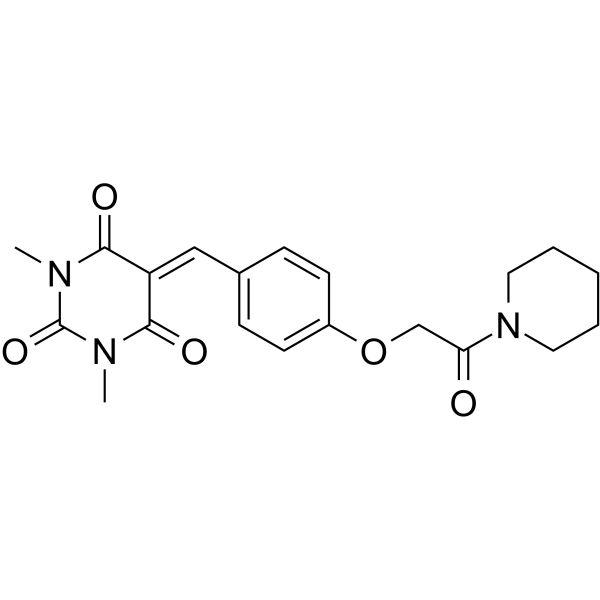| Description |
PARP1-IN-10 (compound 12c) is a no-cytotoxicity and potent PARP1 inhibitor with an IC50 value of 50.62 nM in vitro. PARP1-IN-10 causes cell cycle arrest at G2/M phase and apoptosis, and enhances the cytotoxicity of temozolomide (TMZ) [1].
|
| Related Catalog |
|
| Target |
PARP1:50.62 nM (IC50, [1])
|
| In Vitro |
PARP1-IN-10 (compound 12c) (10 μM, 48 h) shows no cytotoxic effects against NCI-60 human tumor cell lines[1]. PARP1-IN-10 inhibits MDA-MB-436 cell line with an IC50 value of 3.73 μM[1]. PARP1-IN-10 (1 and 3.73 μM, 48 h) causes cell cyle arrest at G2/M with dose-dependent manner[1]. PARP1-IN-10 (0.5 μM, 48 h) shows antiprolifetative effect of temozolomide (TMZ) about 7 times (IC50 = 3.64 μM) in A549 cell line compared to TMZ alone (IC50=24.2 μM)[1]. Cell Cytotoxicity Assay[1] Cell Line: NCI-60 human tumor cells Concentration: 10 μM Incubation Time: 48 hours Result: Showed no toxicity. Cell Cycle Analysis[1] Cell Line: MDA-MB-436 cells Concentration: 0, 1, 3.73 μM Incubation Time: 48 hours Result: Caused cell cycle arrest at G2/M and showed apoptotic effect in dose-dependent manner. Apoptosis Analysis[1] Cell Line: A549 human lung cancer cells Concentration: 0, 0.5, 7.94 μM Incubation Time: 48 hours Result: Potentiated the antiproliferative effect of temozolomide (TMZ) 7 times compared with TMZ alone.
|
| References |
[1]. Essam Eldin A. Osman, et al. Design and synthesis of some barbituric and 1,3-dimethylbarbituric acid derivatives: A non-classical scaffold for potential PARP1 inhibitors. Bioorg Chem. 2020 Aug; 104: 104198.
|
